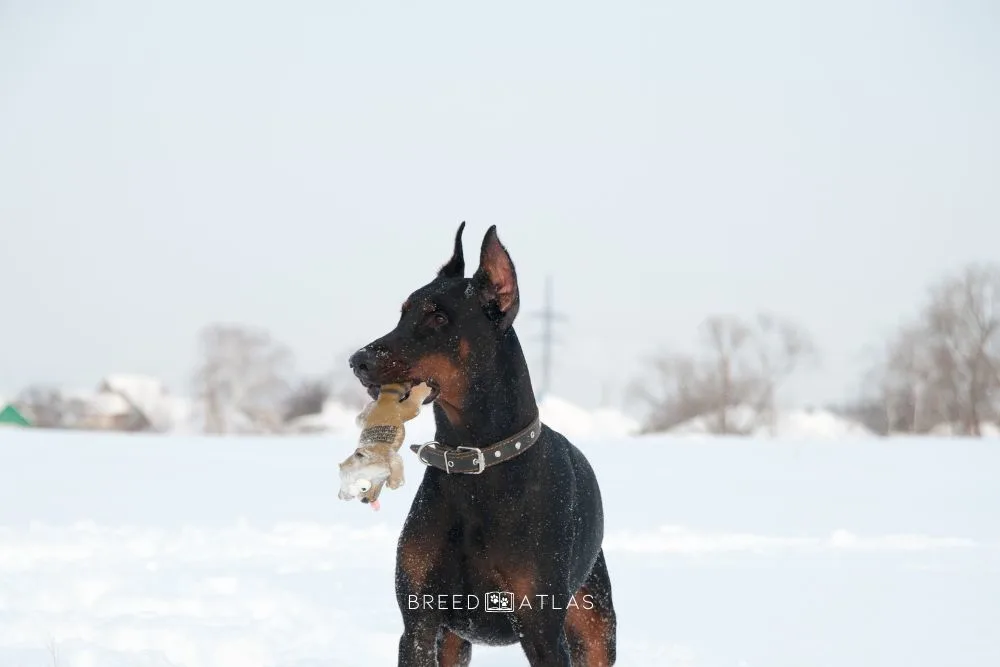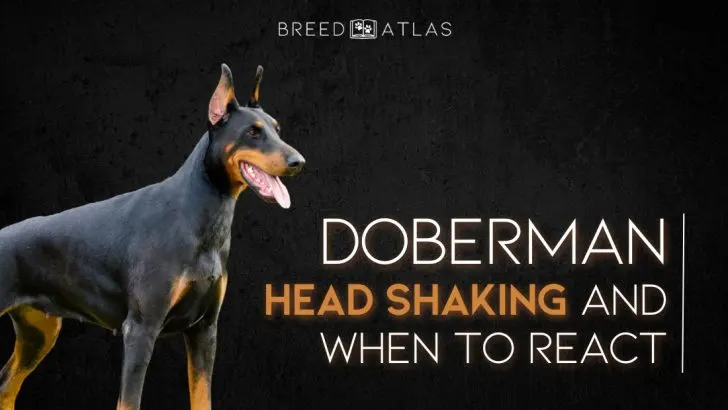Our dogs are like family members, so it’s extremely devastating when something happens, or they feel sick. It isn’t surprising that seeing your Doberman head shaking can terrify you at first glance.
Is this something that should concern you, or is this a normal activity Doberman experiences?
There are several reasons why a Doberman might shake his head, and not all are voluntary. Some causes of this behavior might even require emergency vet visits.
Let’s see all the possible causes of Doberman head shaking and what you can do to help your pup – if help is even needed.
Why Does My Doberman Shake His Head Voluntarily?
In many cases, your Doberman might be shaking his head voluntarily. This typically happens after a head scratch, a long stretch, an afternoon nap, or a bath. You might notice your
Voluntary Doberman head shaking is an entirely natural activity that you shouldn’t worry about normally. You can recognize them as your dog will be shaking his head from side to side.
However, if you notice your Dobe shaking his head in continuity, maybe it’s time to check up on him to make sure everything is alright.
Here are some of the reasons why your pup might be doing this:
Discomfort
The most common reason why your Doberman might be shaking his head is discomfort.
Your pup doesn’t have hands like we do. If he feels some type of discomfort deep in his ear or his mouth, he cannot simply scratch himself. As such, the first thing he might attempt is to shake his head.
This is especially common after a bath or outdoor playtime, as something might’ve gone into his ear, or he might’ve inhaled something.
Most of the time, this is a benign activity, just like we would scratch our ears or pick our noses when they itch.
Sometimes, however, this can be a first sign of a more severe issue. Maybe your dog has eaten something poisonous, or there is something stuck in his ear.
Either way, if you notice one of these symptoms, you should rush to the vet immediately:
- Continuous head shaking
- Foam at mouth
- Bloody nose, mouth, or ears
- Bright red lips or inside of the mouth
Allergies
Another reason why your pup might be feeling discomfort is allergies.
Just like humans, Dobermans can be allergic to practically anything. Some of the most common allergens for dogs include:
- Mold spores
- Pollen
- Fleas
- Dust
- Mites
If you notice your Dobie shaking his head from time to time for several days, or if the shaking is followed by sneezing, runny nose, or watery eyes, it’s a good idea to contact your vet for advice.
Involuntary Doberman Head Shaking

More severe are head shakes that are happening involuntarily. These shakes will look uncontrollable or might even resemble tremors. Sometimes, your Doberman might appear to be bobbing his head like a bobblehead figure.
These shakes are typically due to some damage or deformity in the central nervous system. Your Dobie will have to go through an extensive physical examination to find the exact cause of this condition.
Unfortunately, large head tremors can be a sign of a severe underlying condition, especially if you have an older Doberman.
If you notice your Doberman shaking his head uncontrollably, contact your local vet as quickly as possible – especially if this is the first time he is experiencing head tremors
Here are the most common health conditions that might be the cause:
Head Bobbing Syndrome
Head Bobbing Syndrome, also known as Episodic Head Tremor Syndrome , is a condition that causes head shaking and twitching in dogs. Occasionally, it can also lead to teeth chattering.
Head Bobbing Syndrome is a very common condition in the Doberman breed, as well as in English Bulldogs . In fact, sources state that about 8% of all reported cases were Doberman Pinschers.
The shakiness from this condition is typically mild, but some violent head tremors have also been reported. Most of the time, these tremors will last about 3 minutes. They can happen several times a day, and most Doberman pups will go about 2 months between the episodes.
Most Dobermans that have developed this condition were young to middle-aged. It will rarely appear in senior dogs.
Some of the possible causes of this syndrome include:
- Brain abnormalities
- Genetic conditions
- Stereotypy
- Low glucose levels
- Heartworm medications
- Calcium deficiency
It is still uncertain whether Dobermans are aware of these episodes or not.
Some Doberman owners might confuse these head tremors for epileptic seizures.
However, these episodes are not true seizures, as the dog’s consciousness won’t be altered, and it won’t have other syndromes typical of epilepsy, such as tremors in his entire body, drooling, and muscle twitching.
Treatment
Sadly, as the exact cause of this condition is unknown, there is no cure for Head Bobbing Syndrome. However, it seems that distracting your dog can help him get through the episode more easily or even stop the shaking altogether.
It seems that by making your dog use his mind, you can make the tremors stop.
Use a toy or a treat to get your Dobie’s attention. Try playing his favorite game, such as fetch or a tug-of-war. Even a training session can do the job!
Another option is to just stand by and let the head tremors pass. Head Bobbing Syndrome typically isn’t dangerous for your pooch, and there don’t seem to be any long-term consequences to this condition.
Canine Distemper Virus
Canine Distemper Virus is a highly contagious disease that is rather common in kennels and in unvaccinated dogs.
This illness affects a dog’s gastrointestinal, respiratory, and nervous systems. One of the common symptoms of the Canine Distemper Virus is myoclonus, which is the involuntary twitching of muscles, usually in the limbs or the head.
Other signs of Canine Distemper Virus include:
- Thick discharge
- Head circling and tilt
- Fever
- Vomiting and diarrhea
- Reduced appetite
- Lethargy
- Seizures
Treatment
Canine Distemper Virus is an untreatable illness. There is no medicine that can cure your Doberman and make him instantly feel better.
However, veterinarians can deal with the symptoms and attempt to make your Dobie feel better and stronger. This includes keeping your pooch hydrated and preventing secondary infections.
Unfortunately, this is a health condition with a high death rate. Whether your pup will survive or not greatly depends on its immune system.
Still, this doesn’t mean you shouldn’t take your Doberman to the vet – quite the opposite. A veterinarian can help keep your dog alive until he fights off the infection.
Also, there is a vaccine that can prevent your dog from catching this virus. In fact, this is one of the mandatory vaccines all dogs will take during puppyhood.
Considering that it is an airborne disease, vaccination is the best way to keep your dog safe. Otherwise, he can get infected the moment he is around sick dogs.
Cerebral Hypoplasia
Cerebral Hypoplasia can be an infectious or inherited condition that is detectable in young puppies.
This movement disorder is basically a canine version of cerebral palsy, and most breeders will notice it when the pups start learning to walk, at around 6 weeks old. It causes a dog’s cerebellum to develop improperly, affecting the pup’s motor skills.
Some of the symptoms include:
- Head shaking
- Tremors
- Dysmetria
- Ataxia
- Wide stance
- Balance issues
Most Dobermans will get this condition after an infection. It will rarely be genetic in this breed. On the other hand, some dog breeds that can have genetic predispositions to it include Bull Terriers, Chow Chows, Irish Setters, and Boston Terriers.
Treatment
Just like with other health problems I have listed, there is no real cure for Cerebral Hypoplasia, and you and your Dobie will just have to learn to live with it.
And if you’ve wondered do head tremors from Cerebral Hypoplasia get worse, I have good news: This isn’t a progressive condition. You’ll know just how many coordination problems your Doberman will have from puppyhood.
These dogs can have a long and fulfilled life with the right families. They might need some extra attention, but they won’t be aware that they’re not like any other dog.
Idiopathic Head Tremors
Idiopathic head tremors are tremors for which the cause is unknown. As such, these can vary from typical head tremors to head bobbing, but most of the time, there are no other symptoms.
It is challenging to list all clinical signs of idiopathic head tremors, as these can vary greatly. Some of the characteristics of this type of head bobbing include:
- They only happen in the dog’s head and not in the other body parts.
- They tend to happen when the dog is relaxed and rarely when he is doing something.
- Most of them are short-lasting.
- Your dog won’t seem to be upset by them.
This unique condition only affects younger dogs and is unlikely in Doberman seniors. Many times, some degree of degeneration of nerves will be present, but this isn’t always the case.
Some experts think idiopathic head tremors are a sign of emerging genetic diseases, but this is still disputable.
Treatment
There is no cure for idiopathic head tremors. However, most of the time, the condition becomes easier as the dog grows older. Many owners have reported their Dobies have stopped having tremors in old age entirely.
Epilepsy
Epilepsy is a condition characterized by seizures. As mentioned before, most of these seizures affect a dog’s whole body and are followed by many other symptoms.
What some owners don’t understand is that epileptic seizures have various forms. They are caused by abnormal activity in the motor region of your dog’s brain and can cause unusual movements in just one part of the body. This can include head shaking.
Most dogs will be unconscious during epileptic seizures. They aren’t painful, even though your dog might look like he’s suffering.
There isn’t a specific gene causing epilepsy. In fact, its exact cause is still unknown. Some dogs might develop epilepsy after a head injury. For others, the condition will be hereditary.
Treatment
Epilepsy is typically a life-long condition, although sometimes it can go away on itself.
If your Doberman has epileptic seizures, it’s essential to take him to the vet, who will prescribe the necessary medication such as Phenobarbital, potassium bromide or Levetiracetam.
The exact treatment might vary depending on the dog and the type of seizures.
Most Dobermans can live their full lifespan despite having epilepsy. Still, these seizures can worsen over time, and your dog can die during stronger ones. This is why it’s important to contact your vet and start the treatment as soon as possible.
Are Head Tremors Common?
Most of the time, owners will become very worried when they realize their Doberman is shaking his head uncontrollably.
However, what many breeders won’t tell you is that head tremors are rather common in the Doberman breed. Many dogs will experience episodes of tremors at least once in their lifetime.
Fortunately, head tremors on their own are rarely dangerous. Sure, they can be uncomfortable to the dog, but your Doberman isn’t in pain.
Still, it’s important to find the root cause of this condition so you can rule out any medical emergencies.
In Conclusion
The phenomenon of a Doberman head shaking can have many causes. Some are behavioral; others have more serious causes.
While occasional head shaking may be harmless and natural behavior for some dogs, persistent or violent shaking could indicate underlying health concerns such as ear infections, neurological disorders, or allergies.
This is why it’s important for Doberman owners to closely monitor their pets’ behavior and seek veterinary attention when necessary.
Don’t panic if you notice head tremors in your Doberman. However, take him to the vet and try to find the underlying cause. Some can be solved, but others might be long-lasting.
With proper care, you can help your Doberman live a long and healthy life.

Meet Iram, a devoted veterinarian, passionate dog lover, and current Ph.D. candidate at Utrecht University in the Netherlands. Seamlessly blending her roles as a vet and content writer, Iram channels her love for dogs into heartfelt narratives.
Since childhood, Iram nurtured a dream of becoming a vet, a passion that runs deep in her family. Having now fulfilled that dream, she’s eager to share her acquired knowledge. In her writing, Iram not only explores the emotional bond between humans and their canine friends but also integrates her veterinary expertise, offering readers a holistic understanding of their beloved pets.
